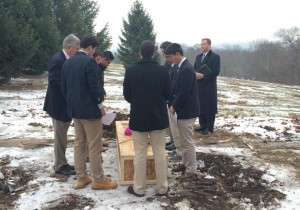The word “corporal” means “of or belonging to the body,” and so the corporal works of mercy refer to acts of mercy that relate to the physical needs. They respond to the basic needs of humanity as we journey together through this life. Many of the corporal works of mercy were referenced directly by Christ in Matthew 25:31-46: “For I was hungry and you gave me food, I was thirsty and you gave me drink, I was a stranger and you welcomed me, I was naked and you clothed me, I was sick and you visited me, I was in prison and you came to me. . . Truly, I say to you, as you did it to one of the least of these my brethren, you did it to me.” (Matthew 25:35-36, 40)
The 7 Corporal Works of Mercy
1. To feed the hungry
2. To give drink to the thirsty.
3. To clothe the naked.
4. To shelter the homeless.
5. To visit the imprisoned.
6. To visit the sick.
7. To bury the dead.

THOMAS FARRAGHER/GLOBE STAFF
Seniors at Roxbury Latin School were pallbearers for James McDermott, a homeless man who drowned in the Charles River in July.
Bury the Dead – What can I do? The last corporal work of mercy- bury the dead – may seem very obvious as most of us make sure that our relatives and friends have a proper funeral service. But we also need to be aware of the needs of those who are grieving: struggling to “bury their dead” emotionally. We need to help one another to truly bury our lost loved ones by letting go of them, entrusting them to the hands of our merciful Creator. That takes friendship — a patient friend that keeps on visiting the bereaved even when the grieving process takes many months or even years. This is a precious work of mercy: to help one another emotionally “bury the dead.”
What about the homeless or those with no living family or friends? A very moving story by Boston Globe columnist Thomas Farragher appeared in the the Globe in January about burying the homeless and how seniors at Roxbury Latin School volunteered to be pallbearers. You can read it here: In death, Roxbury Latin students get a lesson in life

